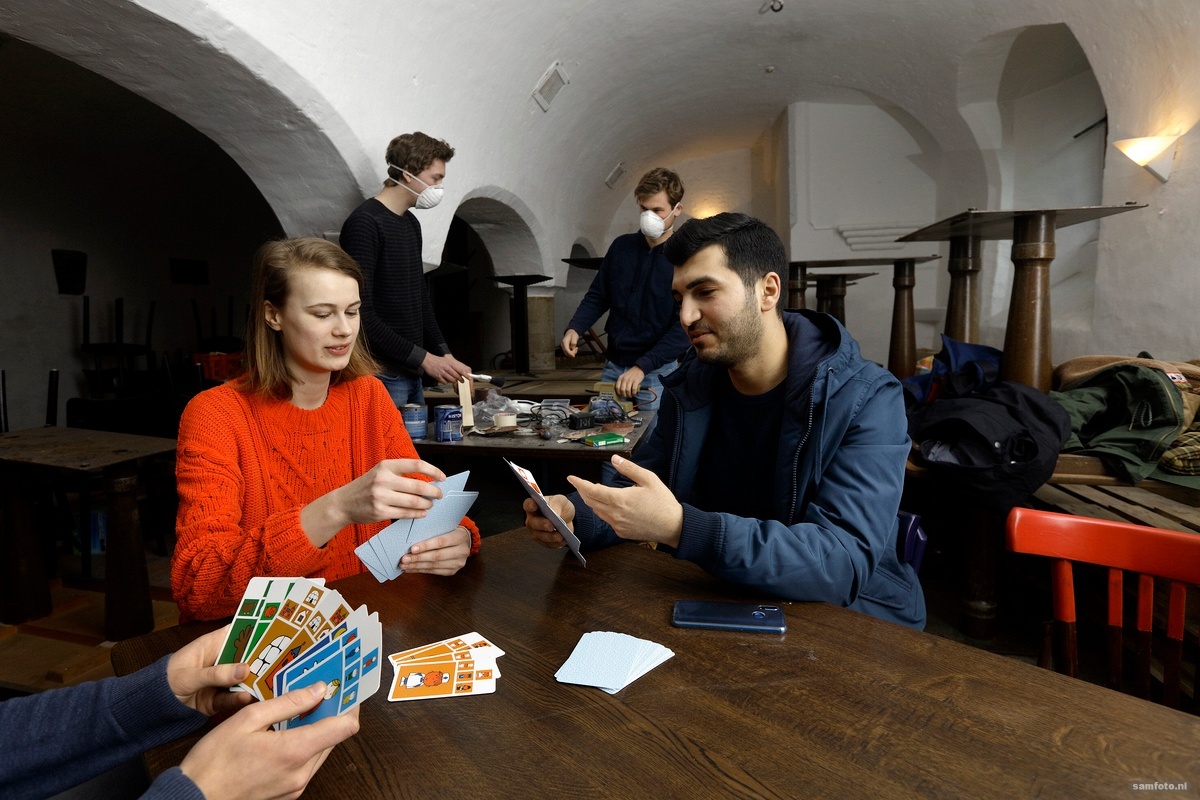After the success of its first time round, De Hartige Samaritaan restaurant is opening its doors again. Delta spoke to two volunteers about fleeing, quartets and hard work.
Volunteers Eva van der Kooij and Mohamad play quartets in restaurant Hartige Samaritaan. (Photo: Sam Rentmeester)
He travelled more than 4,500 kilometres. From his home land Syria, Mohamad (surname is known to editor) came to the Netherlands via Greece. He attempted to leave Athens many times by airplane and succeeded on the tenth attempt.
Once in the Netherlands, Mohamad ended up in the asylum seekers centre in Ter Apel in Groningen. Now, more than two years later, he finally lives in his ‘dream town’, Delft. “I want to do my master’s here in two years’ time,” he explains in a blend of English and Dutch. “But first I want to spend one year learning Dutch.”
Pop-up restaurant
Eva van der Kooij smiles as Mohamad tells his story. The student of environmental engineering met him in October at KoffieNL, the Delftse Buur language café and involved him in the voluntary organisation, the Hartige Samaritaan. The non-profit, established in 2016, works for the integration and acceptance of refugees and residence card holders in the Netherlands, and within that, in Delft.
One of the non-profit’s most successful projects is the pop-up restaurant, De Hartige Samaritaan, that will open its doors for the second time on Saturday 23 February. This time the location is Schoolstraat 11 and refugees and Dutch people will work there together. “By letting refugees and Dutch people get to know each other’s cultures, we hope to encourage acceptance and integration,” explains Van der Kooij.
This is exactly what appeals to Mohamad. “When I just arrived in Delft I knew very few people. Voluntary work has always been a way for me to come into contact with others and to avoid getting bored. There was nothing to do in the first couple of months in Ter Apel. Ultimately I could help out in a gym where I went every day. I still talk to the people that I met there.”
Mohamad now works for the PR & Communications department and will later work in De Hartige Samaritaan restaurant. “Lots of Dutch volunteers work in the restaurant too,” adds Van der Kooij. “We are only open for one month and that allows people to experience voluntary work in an accessible way. This is how I experienced it too. I worked for a couple of evenings and now I work here full-time.” To do this work, Van der Kooij has put her studies on hold for six months. “But it is more than worth it.”
Quartets and hard work
De Hartige Samaritaan has helped forged a strong bond between Mohamad and Van der Kooij and they have learned a lot from each other. “Like quartets!” calls out Van der Kooij immediately. Mohamad laughs. “And Eva taught me what hard work means.”
Van der Kooij says that Mohamad’s Dutch has really improved. “You now greet us in Dutch and you start a conversation in Dutch. You didn’t dare do this at first.” He nods in agreement. “I have to as I don’t get far with English alone. I was intending to study to B1 level, but now I want to go on to B2 level or even higher.” He manages perfectly well in the supermarket. “I know the way things work now and already know words like ‘receipt’ by heart.”
Contact via WhatsApp
Mohamad also unconsciously shows Van der Kooij that she is very privileged. “I live in a country where I speak the language and my parents and sisters live an hour’s train ride away. For Mohamad that is so different. His parents and siblings still live in Syria.” Mohamad smiles, “But I speak to them every day or two on WhatsApp.”
‘I have Dutch lessons four or five times a week’
Despite the difficult decision to leave his family behind, Mohamad is happy that he now lives in Delft. “I have Dutch lessons four or five times a week and am looking forward to starting my master in a year.” For now, he and Van der Kooij are putting all their efforts into the restaurant, which is taking shape nicely. “We are still doing some odd jobs but in preparation we recently held a test evening where we worked with tables and table numbers. It went well, but we ran out of pear salad very quickly,” laughs Van der Kooij.
A hoppy detail, the restaurant will introduce a specially brewed De Hartige Samaritaan beer later this year. “It will be a tasty drink and a memento to take home,” says Van der Kooij.
De Hartige Samaritaan Restaurant
- Open from Saturday 23 February to Saturday 23 March
- Dinner will be served in shifts from 17.30-19.30 and 20.00-22.00 (except for days when there are special activities)
- Reserve online or by phoning 06-23839627
- A three-course meal costs about € 25
- The restaurant’s profits go to the VIP 2 van Vluchtelingenwerk Nederland project, a project that supports refugees to invest in participating in society.
- De Hartige Samaritaan is still looking for volunteers for everything from washing dishes to bar staff. Sign up on the website.
Do you have a question or comment about this article?
m.vanderveldt@tudelft.nl


Comments are closed.